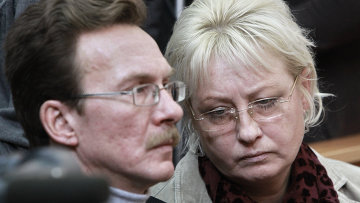STRASBOURG, April 18 (RAPSI) - The European Court of Human Rights held Thursday that Russia failed in many capacities to protect the private and family rights of a couple embroiled in a very public child abuse scandal.
Anton Ageyev and Larisa Ageyeva turned to the ECHR after having lost custody and visitation rights of their adopted children on the basis of allegations of abuse. After the couple's biological son died of severe illness, the couple adopted a boy and a girl. The boy was badly burnt and checked into a hospital, at which point other signs of suspected abuse became evident. The couple claimed that their adopted son had burnt himself after an accident involving an electric tea kettle, and had also fallen down a flight of stairs.
After their parental rights were revoked, the children's adoptions were revoked. The whole affair prompted a media scandal. In 2009 various national mass media outlets ran stories featuring photos of the injured boy and pegging his parents as deviants.
The parents requested Russian authorities to prosecute certain perpetrators for publicly exposing the adopted status of their children.
Agayeva additionally filed a defamation claim against certain perpetrators, albeit unsuccessfully. During the media firestorm she had been widely depicted as - in the words of an ECHR press release on the judgment - "a cruel and sick person" who had been drunk at the time of the boy's accident.
Meanwhile, both parents remained at the center of a criminal investigation arising from the accident. In November 2010, Agayev was cleared of some charges, while the others were dropped. Agayeva was convicted for failure to fulfill her duties of care to minors and intentional infliction of mild harm. She was sentenced to one year and eight months of correctional labor, a punishment where an individual remains free, but is required to pay our a certain portion of his or her paycheck to the federal budget as a means of compensating for misdeeds.
The couple than filed the present complaint with the ECHR.
They claimed numerous violations of the right to a private and family life, as protected by Article 8 of the European Convention on Human Rights (Convention). They complained about the removal of their children, the revocation of the adoptions, and the fact that they were prevented from seeing their children for upwards of a year.
They further challenged violations of their privacy in the forms of: hospital workers granting journalists access to the boy and exposing his adopted status, as well as the failure of the courts to protect them from defamatory statements.
With regard to the removal of the couple's children, the Court held that Article 8 had not been violated. As explained in the Court's release, "Given that the boy had been injured in his parents' house and that criminal proceedings had been brought against them, the Court could accept that the authorities had reasonably considered that placing the children in public care for some time was in their best interest."
With regard to the revocation of the couple's adoption of the children, the Court held that Article 8 had been violated. In the Court's view, mere suspicion of child abuse is not enough to justify such a revocation, and in fact the relevant authorities had "unanimously praised the conditions" that the children had been living in with their family prior to the removal. Furthermore, the revocation decision was made without an adequate assessment of the existing family bonds. And most of the charges pending against the parents were dropped. Thus considering the totality of the circumstances, the Court felt that the revocation of the children's adoption lacked proper justification.
Likewise, the loss of visitation rights for upwards of a year constituted a violation of Article 8 as it resulted from the illegitimate adoption revocation.
The head of the boy's hospital, acting in the capacity of a Moscow city government official, had authorized hospital employees to release photographs and other information about the child to members of the press. This was deemed by the Court to have violated Article 8. Likewise, the governments failure to effectively investigate such unauthorized disclosures constituted a violation of Article 8.
Finally, the Court held that the Russian courts failed to protect Agayeva by failing to allow her to pursue defamation proceedings against journalists and publications that had depicted her as a degenerate.
The Court ordered Russia to pay the couple a total of 67,100 in non-pecuniary damages and legal costs.



